E-mail: koho * office.hiroshima-u.ac.jp (Please replace * with @)
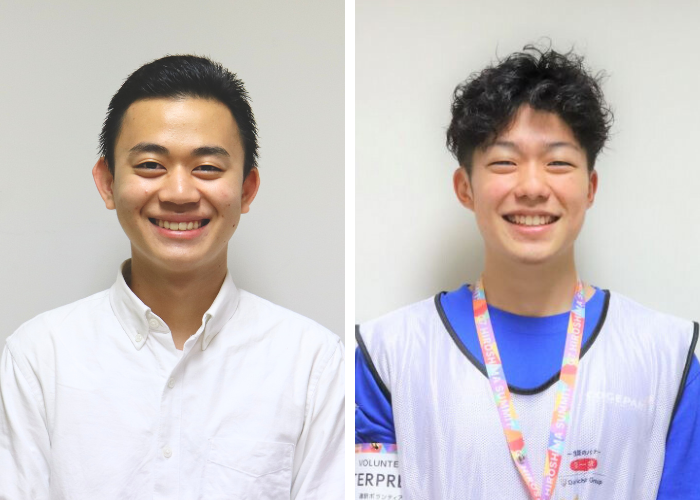
(From the left: Ryunosuke Nakamura and Haruya Eda)
During the G7 Hiroshima summit, held from May 19 to 21, 2023, 123 students from 21 universities, junior colleges, and technical colleges in Hiroshima Prefecture volunteered to provide hospitality and interpretation services.
From our university, a total of 32 students participated in the event: 15 as hospitality volunteers and 17 as interpreter volunteers.
We had the opportunity to interview Ryunosuke Nakamura (2nd year, School of Integrated Arts and Sciences, Department of Integrated Global Studies) and Haruya Eda (4th year, School of Integrated Arts and Sciences, Department of Integrated Global Studies), who served as interpreter volunteers. They shared their reasons for joining and their experiences during the event.
Please tell us why you decided to participate.
Haruya: Regarding the reason for my participation, when I heard that the G7 Summit would be held in Hiroshima, I became interested. Then, I came across a notice from my university about volunteer recruitment. I felt that such opportunities rarely come by, and I could also utilize my language skills. So, I decided to take a leap and applied to be an interpreter volunteer. To provide some background, I was born in Saipan, United States, due to my father's job, and I spent 18 years there until I graduated from high school. I moved to Japan when I was preparing for university entrance exams. Therefore, Japanese is my second language. Even now, I find Kanji characters challenging to read, and I'm constantly working on improving. I usually communicate in Japanese with my Japanese parents and in English with my siblings.
Ryunosuke: I have roots in Myanmar, with my mother being of Myanmar descent. I was born and raised in Myanmar and came to Japan four years ago when I entered high school. My father works in the travel industry, and there have been times when I accompanied him to provide simultaneous interpretation because he is not proficient in Burmese. Through conversations with clients, I naturally became fluent in English, and currently, I am proficient in three languages. I feel that these diverse experiences have been beneficial for my university entrance exams, and I have a strong desire to gain as many experiences as possible during my time at university. That's why I applied for this opportunity.
Through your actual involvement, what did you feel or experience?
Ryunosuke: During the summit period, I accompanied the Ministry of Foreign Affairs-sponsored press tour for the international press corps. I assisted professional interpreters, and the following day, I accompanied staff from the Kenya Broadcasting Corporation as we visited places like the Peace Memorial Park and the Hiroshima Peace Memorial Museum for interviews. On the first day, I aided, but on the following day, I was required to interact one-on-one with the reporters. Interpreting requires different specialized knowledge depending on the field, and I was impressed by the sincere attitude of professional interpreters who, even in areas outside their expertise, strived to meet expectations.
Haruya: I participated in a welcoming dinner for advance teams from various countries such as Germany and Italy. It was an event attended by ministers from various countries, the governor of Hiroshima Prefecture, and many other foreign dignitaries. I was delighted that when I personally greeted people, I would not normally have the chance to meet, they were very friendly and approachable. I had the opportunity to have conversations in English with international participants, learn about their work in their respective countries, engage in casual discussions, and exchange business cards. It was a very enjoyable experience.
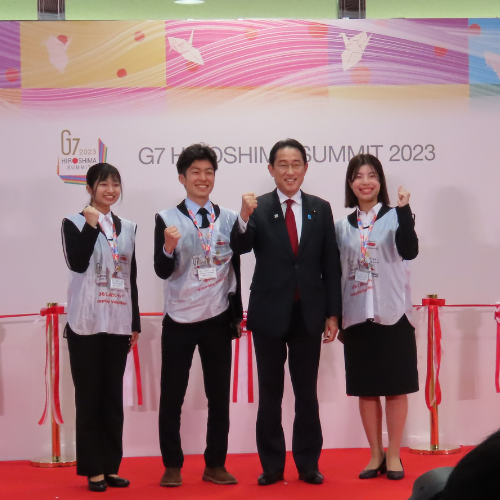
Commemorative photo from the opening ceremony (Photo courtesy of Haruya Eda)
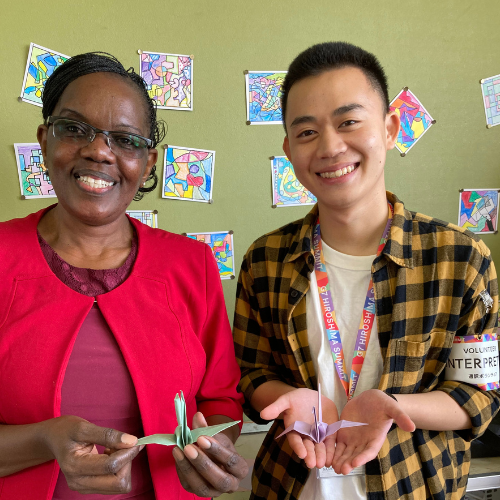
Ryunosuke and the crew from Kenyan TV station (Photo courtesy of Ryunosuke Nakamura)
What left the strongest impression on you?
Haruya: What was particularly impressive for me was participating as the representative of volunteer interpreters at the opening ceremony of the International Media Center and delivering a speech in front of Prime Minister Kishida and others. Since the speech was in Japanese, I had to mentally translate it from English to Japanese and, with the help of friends, I prepared the script. On the day of the event, I started preparing about 4 hours before the start and practiced repeatedly. However, when the moment arrived, just at the very end, I couldn't remember how to pronounce the kanji character for "contribute" in the phrase "I want to contribute to the G7." I was so nervous that my mind went blank, but someone in the audience came to my rescue, and I managed to get through it without any major issues.
Ryunosuke: What was particularly impressive for me was visiting an elementary school with the staff from the Kenya Broadcasting Corporation and hearing directly from survivors of the atomic bombing. It was my first time hearing directly from survivors, and it left a profound impression on me. Being able to hear about the dire situation firsthand, especially as we are often referred to as the last generation who can do so, felt like a precious experience. Additionally, I had some preconceived notions that survivors might be difficult to approach given their backgrounds, but the individuals we interacted with were very gentle and kind. My preconceptions disappeared, and it turned out to be a very positive and enlightening experience.
How do you intend to make use of this experience in the future?
Ryunosuke: This experience has given me a renewed opportunity to think about peace, and I plan to continue learning and contemplating various initiatives to maintain peace, which is something I'm currently studying. Furthermore, my desire to "work internationally" has grown even stronger. As someone with Myanmar heritage, I believe that my success on the international stage can also contribute to the improvement of Myanmar's international standing. Therefore, I aspire to work on global initiatives and make a positive impact in the world.
Haruya: Through the experience of translating the representative speech from English to Japanese, I have developed a stronger desire to study Japanese further. Additionally, this valuable opportunity to interact with people from all around the world has allowed me to learn about Japan's relationship with the world and how the world perceives Japan. In a society where globalization is advancing, I want to think about what I can contribute and what I can do in the future. This experience has encouraged me to reflect on these questions and explore my role in an increasingly internationalized world.
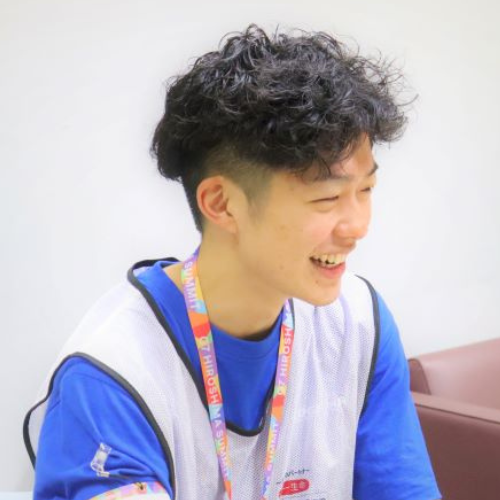
Haruya during the interview
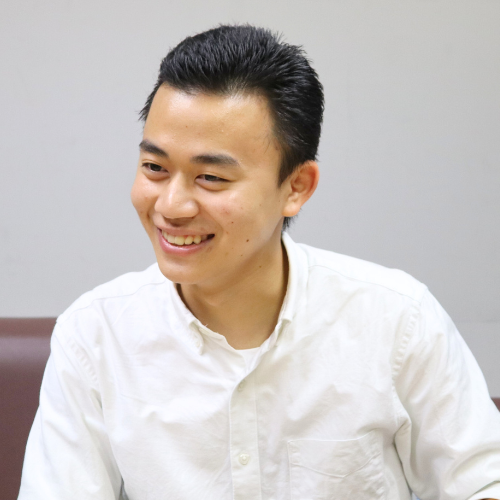
Ryunosuke during the interview
Interview: Public Relations Office (June-July, 2023)
Hiroshima University Public Relations Office

 Home
Home














